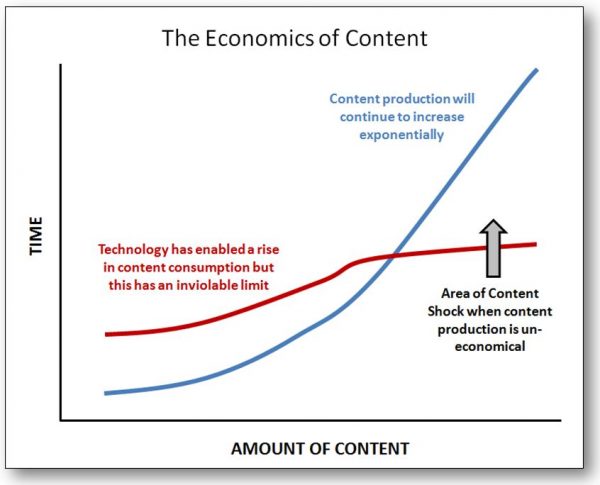Most of January 2014 has seen a debate raging over Mark Schaefer’s “Content Shock” blog post in the content marketing community.
If you haven’t been following this debate through the hundreds of comments and more than 75 follow up blog posts and podcasts, here’s the short version:
According to Mark, new content output is exceeding consumers’ ability to—well—consume it. For businesses in competitive niches, especially very small businesses, the cost of generating enough high quality content to compete against better established content publishers with deeper pockets may exceed any gains they would realize from new business generated by that content.
Essentially, the little guy in a crowded, noisy niche is going to have a harder time winning at content marketing.
The idea that content marketing is becoming less effective (for some businesses, anyway) touched off a firestorm of debate. Many people objected to Mark’s ideas, calling him an alarmist and mistakenly accusing him of proclaiming that content marketing was dead.
That wasn’t Mark’s point. In my opinion, he was acknowledging the reality that content marketing is maturing as an online marketing strategy and it will become harder—for some businesses, not all.
Marketing is one of those niches where Content Shock has already made an impact. I can testify from personal experience that it’s much harder today to reach my intended audience.
Many B2B Companies Still Have It Easy…
Now for the good news: Many businesses in the B2B sphere have little to no competition for content, especially businesses that provide technology solutions.
Content Shock simply doesn’t exist for them.
Aside from the basic reasons I already discussed in the my last post about why you absolutely need content on your website today, there’s one huge motivator for B2B businesses ready to jump into content marketing now: Easy market domination.
And we’re not talking a herculean effort, either, to dominate a market niche. Blogging once or twice a week with articles relevant to their customers would put them light years ahead of their competition.
..But Don’t Wait Too Long
Why start now? Simply because Google rewards publishers (that’s you, if you’re blogging) who have a track record of publishing quality content on a regular basis. By starting now, you are creating a deep reservoir of content.
Imagine you have no competitors who publish “real” content on a regular basis. By “real” content I mean the kind of articles that your customer search for, content that educates and helps them identify and solve problems. Truly useful stuff, as opposed to boring “about me” fluff, the kind most businesses publish on their blogs, like product announcements, employee promotions, and other irrelevant stories that customers rarely would care to read.
Seriously, would you want to read about how your supplier recently completed refurbishing their employee break room? Not likely.
By starting today, blogging just once or twice a week, you would have between 50 to 100 blog posts at this time next year. Imagine how Google would view your website with content like that when your competitors have nothing or are barely getting started.
Content like this does three things for your business:
- Increases website traffic by giving Google and the other search engines reasons to recommend your website over your competitors.
- Creates instant credibility and authority when a prospect visits your website.
- Becomes an integral part of your online lead generation process.
So commit to publishing content now and become the 800 pound gorilla that your competitors fear.


